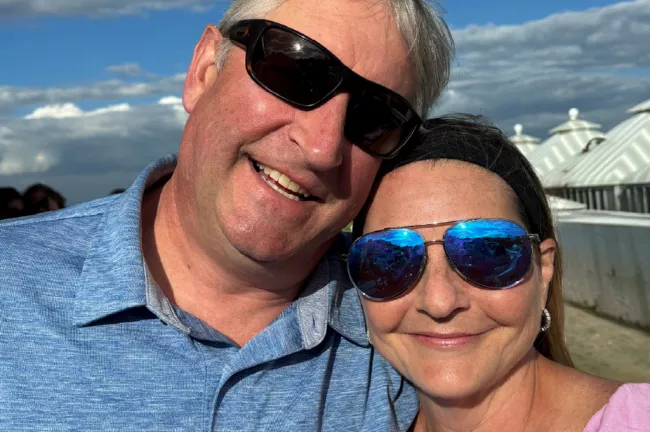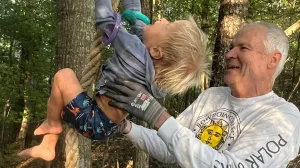
Lifesaving brain surgery gave Stacey her health and sense of self back after a brain tumor caused a drastic personality shift.
Stacey Brown wasn’t particularly surprised when she learned she had a tumor roughly the size of an orange growing on the frontal lobe of her brain. She wasn’t upset or scared or even shocked. Facing this earth-shattering diagnosis, Stacey felt a rush of relief—she finally had an answer.
“I kind of smiled and laughed,” she says. “It was an instant release. It was like a weight had been taken off me.”
A mysterious personality shift
It all began in 2019. Stacey started getting headaches centered over her eyes. At first, she wrote it off as a natural part of aging. “I thought, ‘I’m in my 50s; maybe my eyes are just going,’” she says. But her optometrist told her that her eyes were fine.
Then came the sudden depression and unexplained personality changes. Once an avid CrossFitter, Stacey unexpectedly took up smoking. And formerly known as “the fun one” who never shied away from going to dinner with her husband or meeting close friends over a martini, Stacey found herself reluctant to leave the house when she didn’t have to.
Worse, after nearly 30 years as a model employee, Stacey was now virtually unable to work, falling asleep in the middle of meetings. She stopped paying bills, leaving them to pile up on her desk at home.
Once again, she and doctors shrugged off the change, pinning her symptoms on menopause, stress from her father dying, her mother’s cancer and 2 kids recently graduated from high school. By now, it was well into 2020, and the pandemic provided a ready excuse for more uncharacteristic behavior.
Stacey’s friends and coworkers stepped in to cover for her and pick up the slack at work and with the finances. But they noticed the shift in Stacey’s personality. And so did her family.
“My relationship with my kids was not great,” says Stacey. “It was killing me. I had a son who was dealing with depression, and I couldn’t help him.”
By the end of 2023, the headaches became so severe that Stacey simply couldn’t function.
“I felt like my head was going to explode on my shoulders,” she says. “I started to understand why people do ‘bad things’ to themselves. I wasn’t going to do anything like that. But I was at the point where I didn’t know what I was going to do.”
Finally, answers
Stacey finally went in for an MRI, which discovered the 6-cm brain tumor, called a meningioma, pressing against her frontal lobe. But unfortunately, that wasn’t the end of her plight. While she and her family finally understood what was causing her pain and depression, her insurance denied the surgery that was necessary to relieve her of the burden.
That’s when her friends and family independently suggested she see Tufts Medical Center’s neurosurgeon-in-chief, Carl Heilman, MD, a world-renowned specialist on brain tumors.
“A lot of times, when we see brain tumors, they’re in a part of the brain that handles arm or leg strength, vision, talking, walking or other obvious functions,” says Dr. Heilman. “Stacey’s tumor was pressing on both frontal lobes, the location of the essence of her personality.
“I was in good hands with Dr. Heilman,” she says. “He talked me through everything, and on the day of the surgery I was calm as a cucumber. ‘Let’s do this!’ I didn’t have any emotion, but maybe that was a good thing. I wasn’t really able to process what was going on.”
After the complicated surgery to remove the tumor, Stacey woke up and was taken to the waiting room where her husband and friends were eager to see her. They noticed a difference right away. Stacey wanted music, wanted to dance and she was cracking jokes. In other words, the real Stacey was back.
“I was having so much fun and making such a scene, my friends joked, ‘Maybe we should have thought about this,’” says Stacey. “I had lost myself. And now here I was.”
Dr. Heilman recognized the day-and-night difference in his patient’s personality. “When I first met her, she admitted all these personality changes in retrospect, but she was quiet and reserved. Her husband answered most of my questions,” says Dr. Heilman. “Now she’s much livelier.”
“Everybody at Tufts Medical Center was amazing,” she says. “I would go back there for any other treatment.”


